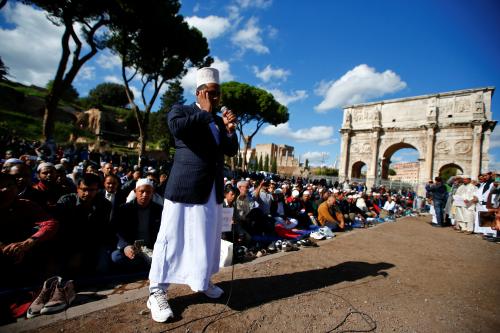American Muslims’ increasing importance as a voting bloc has wider implications for U.S. foreign policy and the 2020 general election, write Adham Sahloul and Shadi Hamid. This piece originally appeared on Lawfare.
Muslims represent only around 1% of the American population, yet today they find themselves playing an increasingly important public role. For instance, two of the most prominent congresspeople are the first two Muslim congresswomen in American history, Ilhan Omar and Rashida Tlaib. Like African Americans and Jews, Muslims are disproportionately Democrats. But what did they actually think and want in a competitive Democratic primary? A January survey found that 39% of Muslims believe Sanders is the “best nominee for President of the United States,” followed by former Vice President Joe Biden. At satellite caucuses at mosques in the Iowa caucuses, the vast majority of Muslims attending supported Sanders. Even as his chances began to dwindle, Sanders received an outpouring of endorsements and surrogate support from the Michigan Muslim community.
Foreign policy is an important lens for understanding Muslim voters’ preferences in the primary. Despite their demographic and ideological diversity, American Muslims of immigrant backgrounds are for the most part unified in the importance they place on foreign policy. In its post-2016 election survey of Muslim voters, Emgage, a leading American Muslim civic engagement organization, found that while Muslim voters prioritize the economy above all, foreign policy and national security mattered at least as much as health care, immigration and education policies. Beyond grand strategy and policy papers, a candidate’s perceived foreign policy outlook seems to be a strong determinant of Muslims’ feelings toward the candidate. This matters because, though they are far from monolithic, Muslims are a critical community in the future of the Democratic Party, and Democrats seeking to get smarter and better on foreign policy can benefit from seeking the input of American Muslim experts and constituents.
American Muslim politics are changing but are still biased toward “motherland” politics. Middle Eastern and South Asian Muslims constitute the majority of the American Muslim population, and the most well-known national Muslim civic organizations have been founded and led by members of these communities, mostly first and second-generation professionals. These immigrant-led conversations too often push to the side the policy concerns of African American Muslims, who have been in the United States since before its founding, but both groups share some similar experiences in post-9/11 national security conversations. To many American Muslims, foreign policy is about basic national security but also an extension of identity politics. Two decades of “war on terror” policies targeting the Muslim world has securitized Muslims’ relationship with their own government and otherized Muslims by treating Islam as a foreign policy problem to be solved.
According to the Pew Research Center, 89% of American Muslims are proud to be both Americans and Muslims. For many American Muslims, being both American and belonging to the Muslim body politic is the common currency and shapes their worldview in important ways. Seen through this prism, the so-called bipartisan foreign policy consensus isn’t something to return to and reclaim; it’s part of the problem.
Passion for motherland and ummah policies isn’t unlike the political activity of other communities with a strong diaspora character—think American Jews and Israel-Palestine, Cuban Americans and Cuba, or Polish Americans during the Cold War. It’s also worth noting that Arab and South Asian Muslims have not necessarily been longtime champions of progressive policies. This is a community that is relatively new to politics and policy. In the 2000 election, community leaders backed George W. Bush over Al Gore, but Bush’s invasion of Iraq and the Republican Party’s drift toward Islamophobia drove American Muslims toward the Democratic Party en masse. The attacks on civil liberties by the GOP drew even the most socially conservative Muslims to building coalitions with progressive, LGBTQ and women’s rights groups.
Being and becoming Democrats has rubbed off particularly on young Muslims, who have come to see the progressive movement’s struggles for equality and recognition as intertwined with their own. One example is LGBTQ rights. According to the Pew Research Center, in 2007 only 27% of Muslims in the United States said that homosexuality should be “accepted by society.” By 2017, that proportion had increased to 52%, a remarkable shift that far outpaced rapidly changing attitudes among the U.S. general public more broadly. While young Muslims are more progressive on social issues, support for the Democratic Party more broadly cuts across generations: The Institute for Social Policy and Understanding found in their 2019 American Muslim poll that “83% of Muslims aged 50 and older vote for Democrats in contrast with 44% of their generational peers in the general public.”
It is not surprising that American Muslims, like other Democratic constituencies, would draw a connection between economic and social justice at home and justice abroad. In a recent essay, David Adler and Ben Judah point to the emergence of a new kind of foreign policy orientation—“a progressive foreign politics, which begins from the same premise as Trump—that politics no longer stops at the water’s edge—but inverts its strategies, policies, and priorities.” In such a context, the old notion of a “bipartisan foreign policy consensus” is a contradiction in terms. Moreover, to assume that “motherland” policies shape political preferences alone would be to miss the broader picture of moral frameworks that guide political preferences—particularly for communities of faith. For instance, polling by Gallup, J-Street and others has shown that a large majority of American Jews remain staunchly Democratic despite Trump and the Republican Party’s “pro-Israel” policies. This moral foundation is apparent in the Muslim organization Emgage’s endorsement of Sen. Sanders for president. The organization’s CEO Wa’el Alzayat, a former State Department official, cited “ideas grounded in the belief that all humans are equal and worthy of a dignified life” and praised Sanders’s domestic and foreign policy platforms.
Accordingly, Muslim voters, as much as they hope American credibility can be restored on the world stage, are not exactly fans of the pre-Trump status quo. A plurality of Arab Americans polled in 2016 gave a “poor” rating to Obama’s handling of foreign policy, per Zogby International, with most finding him ineffective at ending the conflict in Syria, resolving the Israeli-Palestinian conflict, and defeating ISIS in Iraq and Syria. Many were critical of Obama’s halfhearted response to the Arab Spring, continued support for various Arab autocrats, inaction in Syria, military drone policy, and the failure to end the war in Afghanistan and close Guantanamo. And while the Trump administration may feature a disdain for the Palestinian people all its own, it would be a mistake to think that Obama moved the needle in favor of justice and dignity for Palestinians. As the Egyptian American scholar and adviser to Sen. Elizabeth Warren’s campaign Khaled Elgindy writes: “Despite being widely viewed as more sympathetic to Palestinian grievances and less sentimental toward Israel, Obama was less willing than most of his predecessors to apply pressure on Israel or to bolster Palestinian leaders to advance the peace process.”
American Muslims overwhelmingly support Palestinian rights and oppose Israel’s repressive policies in the occupied territories, even as they differ on whether a settlement should include one or two states. For decades, being unapologetically pro-Palestine was a liability within both parties. This is no longer the case. Younger Americans, including American Jews, have become increasingly uncomfortable with Israel’s treatment of Palestinian Americans. And Democrats, in particular, have shifted considerably to be more critical of Israel, according to polling by the University of Maryland. In practice, this means that American Muslims’ generally “anti-establishment” views on Israel-Palestine are no longer outliers. And as Trump pushes Republicans ever further to the right on Israel-Palestine, what Democratic candidates are willing to say and do on the conflict has become a critical litmus test for how willing Democrats are to break with the failed policies of the past.
Across the spectrum of the Democratic Party, there is a sea change on Israel-Palestine. No individual in American civic life has made it as politically possible to talk about Palestinian human rights as Sanders. Despite identifying as a Zionist and opposing the Boycott, Divestment, and Sanctions Movement, Sanders has established moral credibility as an American Jew who is relatively consistent in his criticism of decades of irresponsible foreign policy in the Middle East, which has endeared him to Muslims. The grassroots push on Palestine has also made progress in the center-left wing of the party, which has coalesced around Biden. For example, Mayor Pete Buttigieg’s foreign policy approach emphasized putting an “arm around the shoulder” of allies that undermine international norms—such as Israel and Turkey. He also specifically spoke about Israel’s human rights abuses, calling for conditioning aid to Israel over the Netanyahu government’s annexation and settlement-building policies. Moreover, though progressives and the center-left have often been portrayed as competing “lanes,” leading figures in both camps also spoke out against “endless wars”—wars that have tended to be waged in the Muslim world.
Muslims have played an important role in normalizing Palestinians and Palestinian rights. But it would be a mistake to assume that this is primarily religiously motivated. Yes, the status of the Holy Land matters, but Muslims’ emotional and political proximity to Palestinians informs an ethical framework for U.S. foreign policy more broadly—one that takes issue with support for “pro-American” dictators, as well as an overly militarized approach to fighting terrorism.
Importantly, though, America’s Middle East policy doesn’t just affect Muslims in the Middle East; it affects Muslims in the West as well. Today’s conflicts in Syria, Iraq and Libya are sources of instability—refugee crises, extremism and proxy wars—with considerable spillover effects. Mass migration to Europe has fed Eurosceptic narratives and fueled the rise of anti-Muslim parties across the West.
Under successive administrations, U.S. policy in the Middle East has seen failure after failure, culminating in several civil wars and two of the worst humanitarian catastrophes of recent decades. Most of the world’s displaced persons are Muslim, suffering in places that include Syria, Yemen, Kashmir, Myanmar, China, Afghanistan, Iraq and Gaza. These conflicts are exacerbated by and feed into the Islamophobic policies of the Trump administration, including the various iterations of the “Muslim ban.” This is all the more reason for Democratic candidates to work with affected communities at home in defining America’s interests and options in resolving these conflicts. During her campaign, Sen. Elizabeth Warren tweeted in support of democratic protesters in Lebanon and Iraq. Sanders tweeted about anti-regime protests that broke out in Egypt in September. Buttigieg, Warren and Sanders have tweeted about the unfolding humanitarian disaster in Idlib, Syria. Both Sanders and Buttigieg have spoken out about anti-Muslim policies in India. And Biden, Sanders, Buttigieg and Warren each spoke out against the death of American citizen Mustafa Kassem in an Egyptian prison.
To varying degrees, the major Democratic candidates (with the exception of Michael Bloomberg) each drew a contrast to Trump’s coddling of Arab dictators, with even the most “establishment” candidate, Joe Biden, insisting he would make the Saudi regime into a “pariah.” Trump, to his credit, has taken a tough line on China, but this has been based more on his obsession with trade imbalances than human rights abuses. Tying U.S.-China policy more explicitly to China’s techno-authoritarianism is critical, particularly as at least a million Uighur Muslims have been detained in “reeducation camps,” where forced marriage has been endemic.
Supporting a more values-based foreign policy does not necessarily mean taking coercive tools off the table. And alignment with progressives on a more ethical foreign policy does not—and should not—mean inward-looking solutions. Complex global issues require regional expertise and a deep understanding of local dynamics. When engaging with Muslim diaspora communities, policymakers have heard calls not for isolationism but, rather, for a principled foreign policy leveraging diplomatic and military pressure to advance American interests. This mirrors the seven out of 10 Americans surveyed by the Chicago Council on Global Affairs who support strong U.S. engagement abroad. Examples include Syrian Americans who have called for civilian protection in the face of the Assad regime’s brutality, Libyan Americans who supported the NATO intervention against Qaddafi, Egyptian Americans advocating greater U.S. pressure on Egypt, and Balkan Muslims who supported President Bill Clinton’s military intervention in the former Yugoslavia.
Because of Muslims’ personal and religious links to conflict areas, they are more likely to be aware of the failures of American policy and more willing to consider bold alternatives that go well beyond tinkering around the margins. Fortunately, the foreign policy messaging coming from most of the Democratic candidates has reflected the Democratic Party’s broader shift on national security. The campaigns have drawn on Democratic voters’ sense of responsibility where U.S. taxpayer dollars have perpetuated policies antithetical to American ideals and interests. Going forward, candidates for national office interested in inclusive, informed platforms—including the now presumptive Democratic nominee—can and should continue engaging Muslim audiences for whom the global is local: It’s good politics, and even better policy.









Commentary
How foreign policy factors for American Muslims in 2020
April 3, 2020